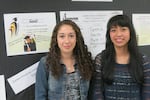Edith Velasco and Jennifer Rodriguez are taking a Spanish exam in a conference room at Riverside High School in Boardman. They're native speakers, and they aced the test. It's more than just a good grade.
"I actually just got 12 college credits for Spanish," said Velasco.
Rodriguez did, too.
"Yeah, I'm like really happy about it because then I don't have to worry about it in the future," she said. "I have my credits for college."

Jennifer Rodriguez (left) and Edith Velasco take an oral Spanish exam at Riverside High School in Boardman. Passing the test gives them 12 college credits.
Rob Manning
Latino students in Oregon graduate 65 percent of the time, and Latino graduates go on to college less than 50 percent of the time. Both those numbers are below the state average.
Eastern Promise is a program that aims to close that gap, in part by offering native Spanish speakers a test to earn college credit. Velasco appreciates it.
"Spanish is kind of our household, and they just told us 'Hey, Eastern Promise is offering this 12-credit test, and you just have to do what you do at home — talk like you're talking with your grandma, and you get 12 credits,' " said Velasco.
Eastern Promise K-12 director Kris Mulvihill said it's a big change from how high schools used to deal with native speakers.
"Those students were the only ones who couldn't access college credit, for the Spanish they already knew," said Mulvihill.
Eastern Promise finds the test for Spanish credit is boosting Latino participation. In the 2012-2013 school year — before the test was available — just 21 percent of Eastern Promise students were Latino. That jumped to 44 percent the year after the tests were available.
For some students, it's a springboard to many more credits.
Yvette Barrera and Stephanie Madrigal graduated from Riverside High as co-valedictorians and recipients of two-year college degrees. Since Eastern Promise was a program under construction during much of their high school careers, finding college credits was its own education. Madrigal had to scramble, and enroll in a few online courses this spring to finish.
"Right now, I'm taking three online courses instead of like, what was it, six? I was going to have to take," said Madgrigal. "That's in addition to my high school classes. In all, I'm taking eight. They told me it was unethical to take that many classes, but I'm doing it, and I'm doing pretty good."

Riverside High Schools' co-valedictorians Stephanie Madrigal (left) and Yvette Barrera graduated with Associate's Degrees, through Eastern Promise.
Rob Manning
Barrera racked up credits at Eastern Oregon University's summer institute — another of the many facets of Eastern Promise. She said it's easier now that it's clearer where to find college credits.
"I think it's better that there is more credits, and they're advertising it more," she said. "It makes it so much easier."
Mulvihill told Barrera and Madrigal they're trailblazers, though school counselors helped them, too.
"I'm thrilled that through your perseverance and initiative, and through what little guidance we could to help at the end of your road, shining the light, saying 'It's this way! Come this way!' because you came this close to not being able to make it," Mulvihill said.
Few students will get degrees like Madrigal and Barrera, but earning college credits is increasingly popular, according to Marie Shimer, the principal at Riverside.
"It has become almost like a tidal wave in the last two years," said Shimer. At Riverside, 80 percent of students are Latino.

Riverside High School in Boardman is more than 80 percent Latino. It's one of more than forty high schools in the Eastern Promise program.
Rob Manning
"It's a culture of higher expectations for students, and we now have students and parents asking to be in those classes versus trying to get out of the upper-level classes," said Shimer.
But it's not a success yet, said Hilda Rosselli, with the Oregon Education Investment Board.
"I would say it hasn't leveled the playing field yet because (the Spanish test for credit) is only 12 credits," said Rosselli. "I would say students who have been seeing themselves, or been told by their families 'You are college material,' and they're taking advanced classes all the way through middle and high school, they're already well ahead on that journey."
To be sure, many of the students accumulating the most college credits have been on a college track for years, but not all of them.
Alcadio Montes just graduated from Stanfield Secondary School. He said he didn't think about college until last year. He's earned more than 40 credits from a variety of classes, including math, biology and computer applications. He's not intimidated by the prospect of going on to college.
"I hadn't really thought about it. I'm just going to go in there, take my classes and just pass 'em," said Montes. "So I feel confident."
Montes plans to finish his associate's degree at Blue Mountain Community College and then head to Portland State University after that. Barrera said she intends to enroll at Portland State too, by way of Portland Community College. And Madrigal is headed to the University of Portland. Two years from now, she plans to have her bachelor's degree.
